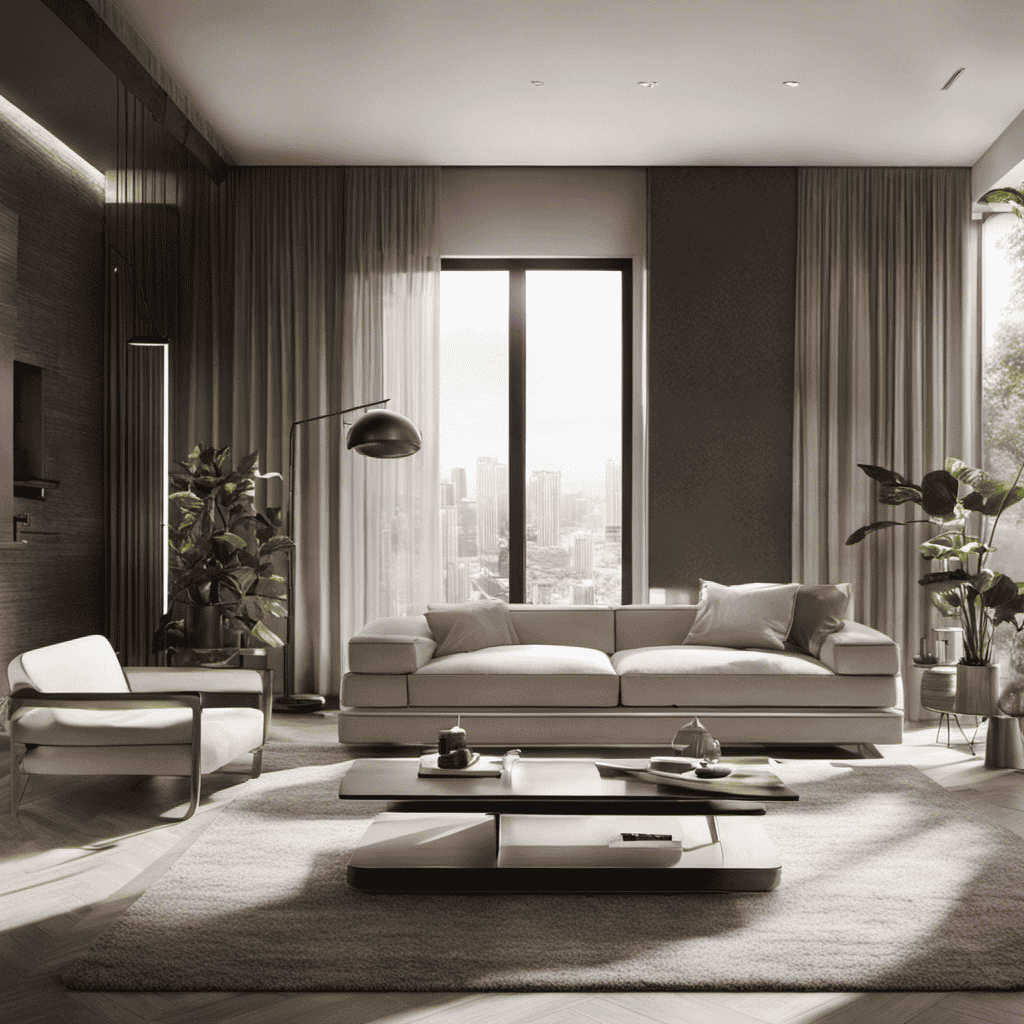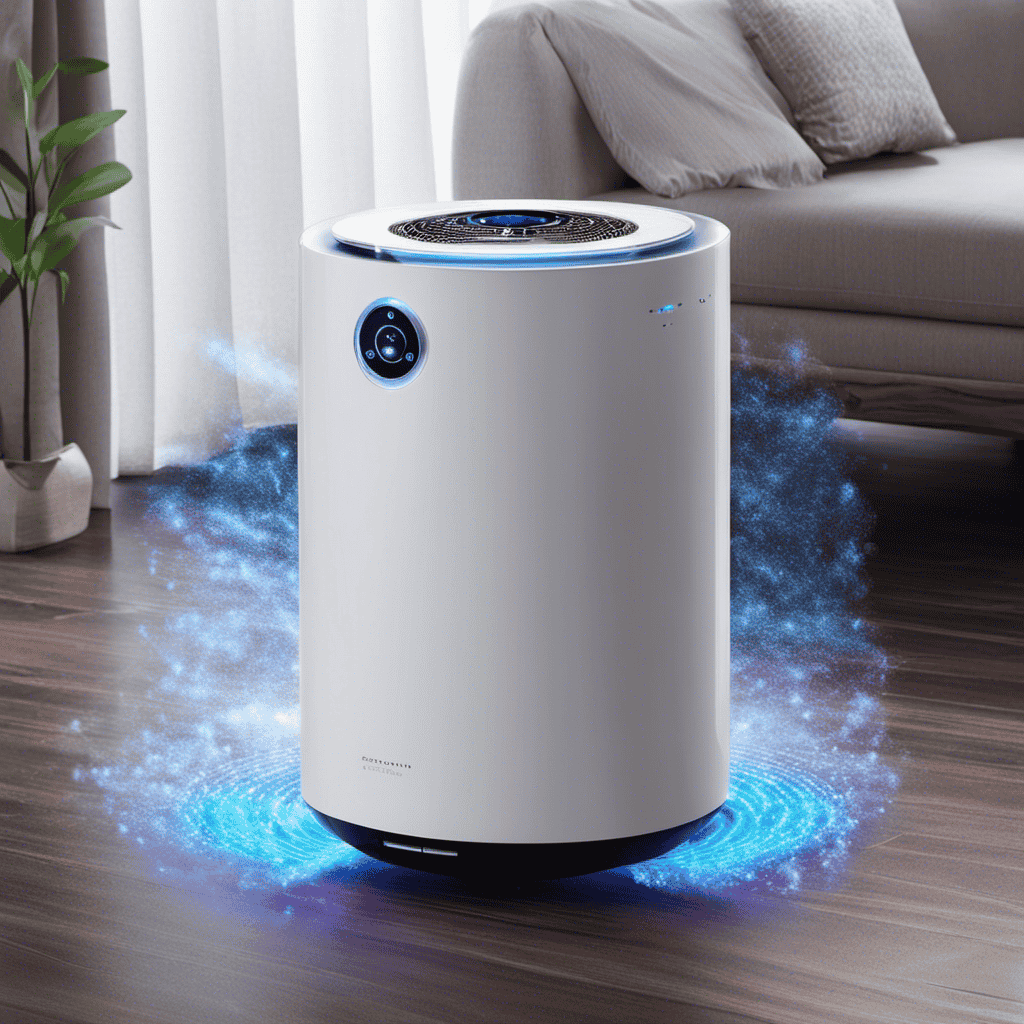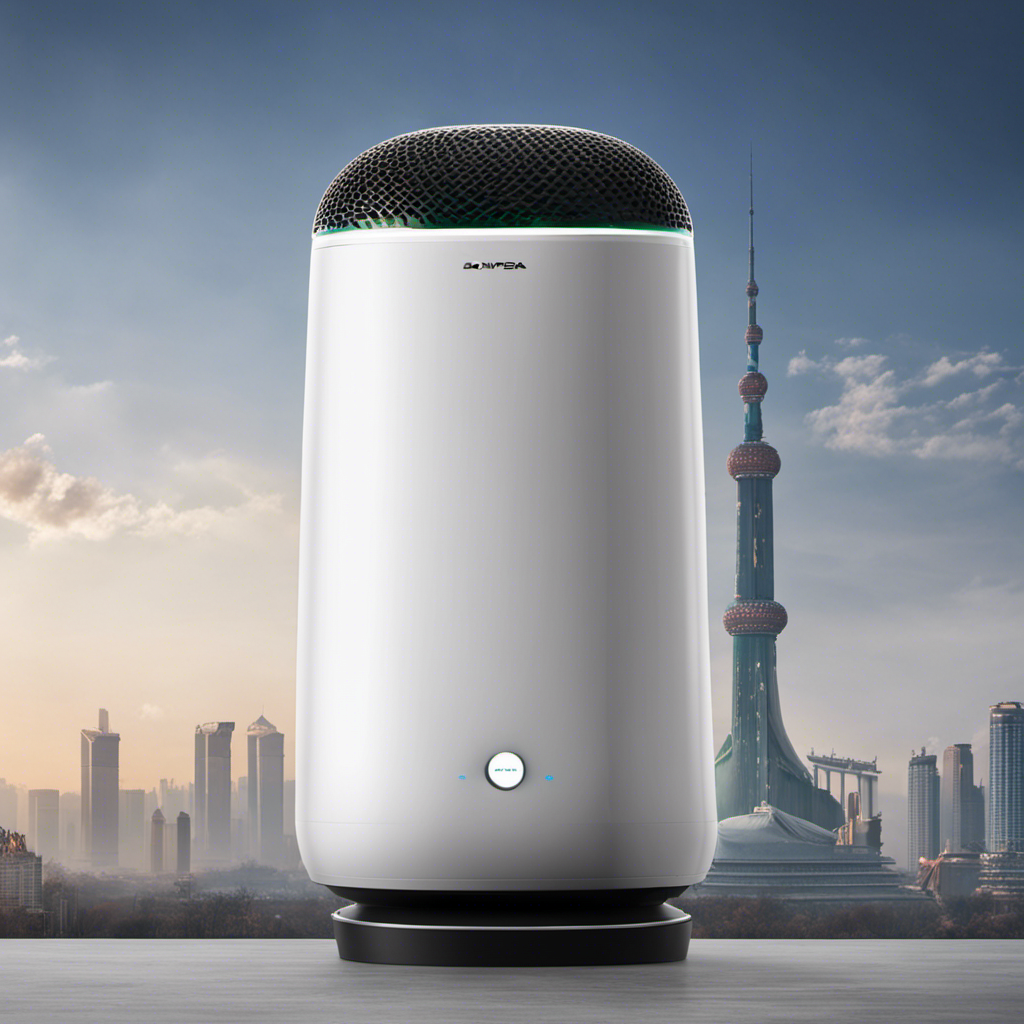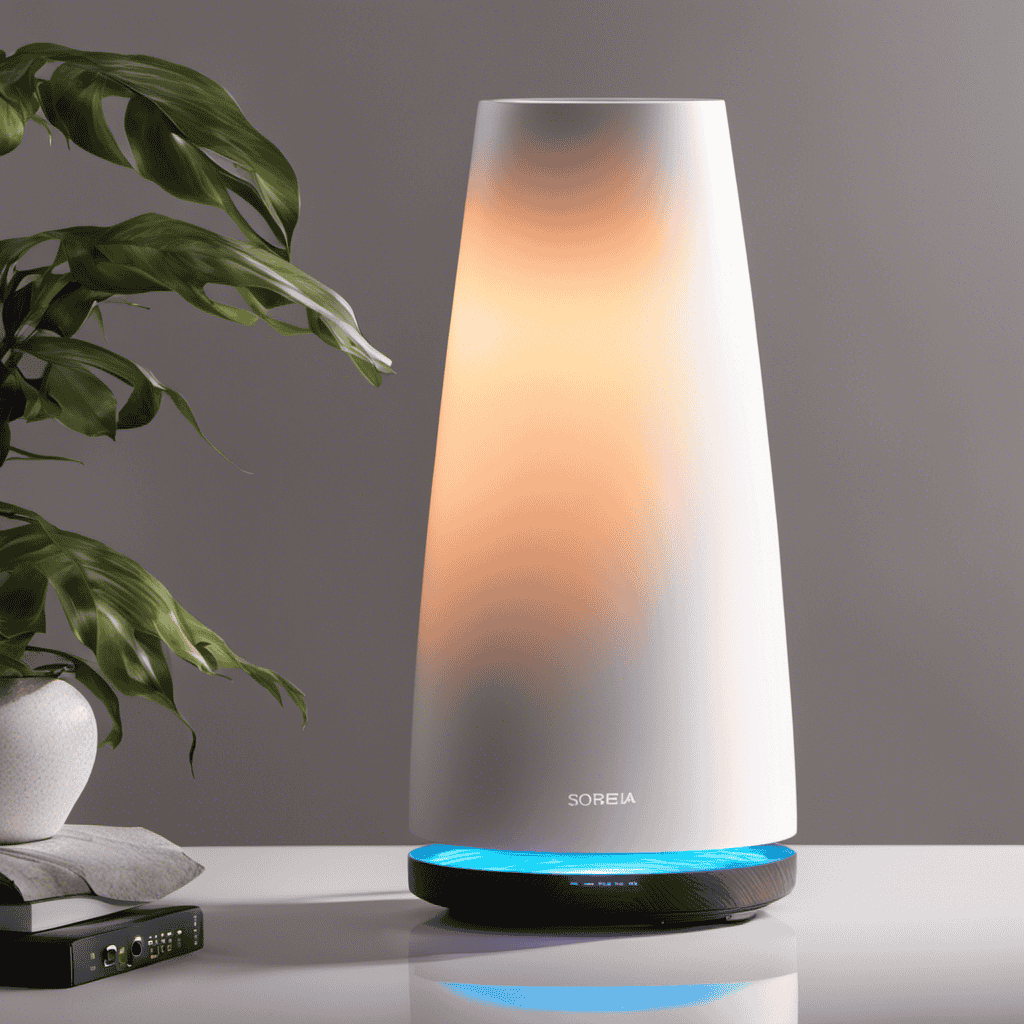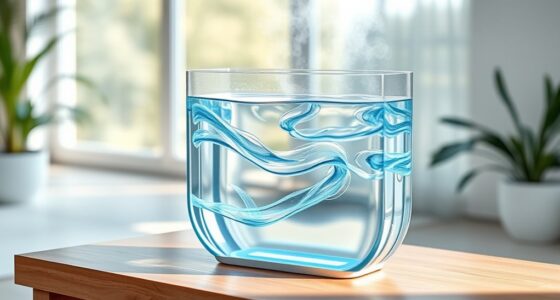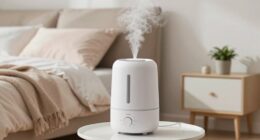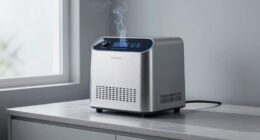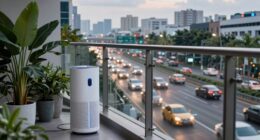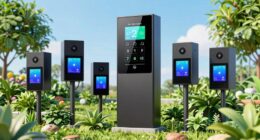Hello!
Ever wondered how a HEPA filter air purifier actually works and why it’s so beneficial? Well, I’ve got you covered.
In this article, we’ll dive deep into the world of HEPA filters, exploring the different types, factors to consider when choosing one, and common misconceptions surrounding them.
Plus, we’ll discuss the importance of regular maintenance and signs that indicate it’s time for a replacement.
So, let’s get started and unravel the wonders of HEPA filter air purifiers together!
Key Takeaways
- HEPA filters trap particles as small as 0.3 microns and capture pollen, dust mites, pet dander, and mold spores.
- HEPA filters ensure cleaner air is released back into the room by allowing air to pass through while capturing particles.
- HEPA filter air purifiers improve overall air circulation and respiratory health, reducing allergies and asthma symptoms.
- When choosing a HEPA filter air purifier, consider factors such as room size, noise level, maintenance requirements, and superior air purification performance.
How Does a HEPA Filter Work
If you want to understand how a HEPA filter works, you should know that it traps tiny particles in the air.
HEPA filter technology is designed to capture particles as small as 0.3 microns, including pollen, dust mites, pet dander, and mold spores.
The filter consists of densely packed fibers that create a maze-like structure, allowing air to pass through while capturing harmful particles.
As air flows through the filter, the particles become trapped, ensuring cleaner air is released back into the room.
The benefits of clean air cannot be overstated. Breathing in clean air can improve respiratory health, reduce allergies, and create a healthier living environment.
Using a HEPA filter air purifier is an effective way to achieve these benefits and maintain a healthier indoor environment.
Benefits of Using a HEPA Filter Air Purifier
You’ll experience cleaner and fresher indoor air by using a HEPA filter air purifier. Here are three reasons why investing in a HEPA filter air purifier can greatly benefit your indoor air quality and help reduce allergies and asthma symptoms:
-
Removal of airborne particles: HEPA filters are designed to capture and trap extremely small particles, such as dust, pollen, pet dander, and mold spores. This filtration process ensures that these allergens and irritants are effectively removed from the air, reducing the risk of respiratory issues.
-
Elimination of harmful gases and odors: HEPA filters can be combined with activated carbon filters, which are highly effective in absorbing and neutralizing harmful gases and unpleasant odors, such as smoke, cooking smells, and chemical fumes. This helps create a healthier and more pleasant environment.
-
Improved overall air circulation: HEPA filter air purifiers not only remove pollutants but also improve the circulation of indoor air. By constantly filtering and circulating the air, these purifiers help to prevent the buildup of stagnant air and maintain a fresh and comfortable living space.
Investing in a HEPA filter air purifier is a practical and effective way to improve indoor air quality and reduce allergies and asthma symptoms.
Understanding the Different Types of Air Filters
To better understand the different types of air filters, I recommend researching and comparing their specific features and benefits.
Air filters come in various types, each designed to target specific types of pollutants in the air. The most common types of air filters include HEPA filters, activated carbon filters, and electrostatic filters.
HEPA filters are highly efficient at capturing particles as small as 0.3 microns, making them ideal for trapping allergens and other airborne contaminants.
Activated carbon filters excel at removing odors and chemical gases from the air.
Electrostatic filters use an electric charge to attract and trap particles.
When choosing an air filter, it’s important to consider the specific pollutants you want to target and the size of the space where the filter will be used.
Factors to Consider When Choosing a HEPA Filter Air Purifier
When choosing a HEPA filter air purifier, it is important to consider several factors that will affect its performance and suitability for your needs.
The first factor to consider is the size of the room where the air purifier will be used. It is crucial to choose a purifier that has the capacity to effectively clean the air in the given space.
Another important factor to consider is the noise level of the purifier. Some models can be quite loud, which may be bothersome, especially if you plan to use it in a bedroom or office.
Lastly, the maintenance requirements of the air purifier should be taken into account. Some models require regular filter replacements or cleaning, while others may have more advanced self-cleaning features.
Considering these factors will help you make an informed decision when choosing a HEPA filter air purifier.
- Superior air purification performance
- Whisper-quiet operation for undisturbed sleep
- Hassle-free maintenance with easy filter replacement options.
Common Misconceptions About HEPA Filter Air Purifiers
When discussing HEPA filter air purifiers, it is important to consider their effectiveness, maintenance, and replacement, as well as the health benefits claimed.
HEPA filters are highly effective at removing airborne particles, such as dust, pollen, and pet dander, with an efficiency rate of 99.97%.
However, it is crucial to regularly clean and replace the filters to maintain their effectiveness.
Additionally, while HEPA filters can improve indoor air quality and potentially alleviate symptoms for allergy and asthma sufferers, it is important to note that they may not provide a complete solution for all respiratory issues.
HEPA Filter Effectiveness
You’ll be pleased to know that HEPA filters are highly effective at removing airborne particles as small as 0.3 microns. They are designed with a dense network of fibers that trap particles and prevent them from circulating in the air.
Here are three reasons why HEPA filters are an excellent choice for air purification:
-
Superior Filtration: HEPA filters capture up to 99.97% of particles, including dust, pollen, pet dander, and mold spores. This ensures cleaner and healthier air in your home or office.
-
Extended Lifespan: With proper maintenance, HEPA filters can last for a long time. Regular vacuuming or washing can help prolong their lifespan and maintain their efficiency.
-
Reduced Allergens: HEPA filters are especially beneficial for individuals with allergies or asthma. By removing allergens from the air, they provide relief and improve indoor air quality.
Now that we understand the effectiveness of HEPA filters, let’s explore how to maintain and replace them to ensure optimal performance.
Maintenance and Replacement
To keep your HEPA filter functioning efficiently, it’s important to follow a regular maintenance schedule. Filter cleaning and maintenance are crucial for ensuring optimal performance and longevity of your air purifier. Here are some key steps to maintain your HEPA filter:
| Maintenance Steps | Frequency |
|---|---|
| Vacuum the filter | Every 1-2 months |
| Rinse the filter | Every 3-6 months |
| Replace the filter | Every 6-12 months |
| Clean the purifier body | Every 3 months |
| Check for damage | Monthly |
Regularly cleaning and replacing your HEPA filter will help remove dirt, dust, and allergens from the air, ensuring clean and healthy indoor air quality. Neglecting filter maintenance can lead to reduced efficiency and compromised air purification. Now that we’ve discussed the importance of filter maintenance, let’s explore the health benefits claimed by HEPA filter air purifiers.
Health Benefits Claimed?
Moving on to the health benefits claimed by HEPA filter air purifiers, there are several claims made by manufacturers and users alike. While these claims may vary, there is scientific evidence to support some of the health benefits. Here are a few notable benefits:
-
Reduction in Allergens: HEPA filters are known for their ability to trap and remove airborne allergens such as pollen, pet dander, and dust mites. This can provide relief for individuals suffering from allergies or asthma.
-
Improved Indoor Air Quality: By capturing and removing fine particles and pollutants, HEPA filters can help improve the overall air quality indoors. This can be particularly beneficial for individuals with respiratory conditions or sensitivities.
-
Decreased Risk of Respiratory Infections: HEPA filters can help remove bacteria and viruses from the air, reducing the risk of respiratory infections. This can be especially important in environments where people are more susceptible to infections, such as hospitals or households with immunocompromised individuals.
While these health benefits are supported by scientific evidence, it’s important to note that the effectiveness of an air purifier may vary depending on factors such as room size and filter quality.
The Importance of Regular Maintenance for HEPA Filter Air Purifiers
When it comes to HEPA filter air purifiers, maximizing the lifespan of the filters is crucial for maintaining optimal air quality.
Regular maintenance plays a significant role in achieving this goal. By following proper cleaning and replacement procedures, you can ensure that your filters are functioning at their best and effectively removing pollutants from the air.
Maximizing Filter Lifespan
One way to prolong the lifespan of your HEPA filter air purifier is by regularly cleaning or replacing the filter. Cleaning the filter is essential to maintain the effectiveness of the air purifier in removing pollutants from the air.
Here are some cleaning techniques that can help maximize the filter lifespan:
- Vacuuming: Use a brush attachment to gently remove dust and debris from the surface of the filter.
- Washing: Some HEPA filters can be washed with water and mild detergent. Follow the manufacturer’s instructions for proper cleaning.
- Air drying: After washing the filter, allow it to air dry completely before reinstalling it in the air purifier.
Ensuring Optimal Air Quality
Now that we’ve discussed how to maximize the lifespan of a HEPA filter, let’s shift our focus to ensuring optimal air quality through proper air purifier maintenance.
Regular maintenance is essential to keep your air purifier running efficiently and effectively. It involves cleaning or replacing filters, cleaning the unit’s exterior, and ensuring proper airflow.
By maintaining your air purifier, you can experience the numerous benefits of clean air. Clean air is crucial for our health and well-being, as it reduces the risk of respiratory problems, allergies, and asthma attacks. It also helps eliminate harmful pollutants, such as dust, pollen, pet dander, and mold spores, from the air we breathe.
5 Signs That Your HEPA Filter Air Purifier Needs Replacement
If you notice a decrease in air quality, it’s likely that your HEPA filter air purifier needs replacement. Regular maintenance is essential to keep your air purifier functioning optimally.
Here are some signs that indicate your HEPA filter may be clogged and in need of replacement:
-
Reduced airflow: If you feel that the air purifier is not circulating air as efficiently as before, it could be due to a clogged filter.
-
Increased dust: If you notice a buildup of dust in your home, it could be a sign that the filter is not effectively capturing particles.
-
Strong odors: A clogged filter may not be able to eliminate odors effectively, resulting in unpleasant smells lingering in your space.
Regularly checking and replacing your HEPA filter is crucial to ensure that it continues to provide clean and fresh air. Don’t neglect the importance of regular maintenance to maintain the efficiency of your air purifier.
HEPA Filter Air Purifiers Vs. Other Air Purification Technologies
HEPA filter air purifiers are known for their effectiveness in capturing small particles. Other air purification technologies such as activated carbon filters and UV-C light can also provide efficient air cleaning.
While HEPA filters excel at trapping particles as small as 0.3 microns, activated carbon filters are designed to remove odors, chemicals, and volatile organic compounds (VOCs) from the air. They work by adsorbing these substances onto their porous surface.
On the other hand, UV-C light is effective in killing bacteria, viruses, and mold spores by damaging their DNA structure.
It is important to note that ozone generators, which produce ozone gas, should not be confused with air purifiers. While HEPA filters and activated carbon filters can improve indoor air quality, ozone generators can be harmful to human health and should be avoided.
Tips for Maximizing the Efficiency of Your HEPA Filter Air Purifier
To maximize your HEPA filter’s efficiency, regularly clean or replace the filter according to the manufacturer’s instructions. Here are some tips for cleaning and maintaining your HEPA filter air purifier:
- Vacuum the external surface of the filter to remove dust and debris buildup.
- Wash the pre-filter, if applicable, with water and mild detergent to remove larger particles.
- Replace the HEPA filter as recommended by the manufacturer to ensure optimal filtration efficiency.
Common problems with HEPA filter air purifiers include clogged filters, reduced airflow, and ineffective purification. Regular maintenance and cleaning can help prevent these issues and maintain the efficiency of your air purifier.
Additionally, it’s important to monitor the air quality in your home and adjust the settings of the air purifier accordingly. By following these tips, you can ensure that your HEPA filter air purifier continues to provide clean and healthy air for you and your family.
Frequently Asked Questions
How Often Should I Replace the HEPA Filter in My Air Purifier?
I replace the HEPA filter in my air purifier every 6-12 months. Regular replacement ensures optimal air purifier maintenance and allows the filter to effectively capture airborne particles, providing the benefits of using a HEPA filter.
Can a HEPA Filter Remove Viruses and Bacteria From the Air?
Yes, HEPA filters can remove viruses and bacteria from the air, helping to prevent the spread of airborne diseases. They are also effective at removing mold spores, making the air cleaner and healthier.
Are HEPA Filter Air Purifiers Effective in Reducing Allergies?
Yes, HEPA filter air purifiers can help reduce allergies by capturing and removing allergens such as pollen, dust mites, and pet dander from the air. They are more effective than other types of air purifiers.
Can a HEPA Filter Remove Odors From the Air?
Yes, a HEPA filter can remove odors from the air. Its high removal efficiency traps odor-causing particles, improving air quality. It’s like having a superhero that eliminates bad smells and leaves your space fresh and clean.
Do HEPA Filter Air Purifiers Make a Lot of Noise?
Yes, HEPA filter air purifiers can have adjustable fan speeds and some models come with remote controls. However, the noise level can vary depending on the specific brand and model.
Are “Hepa” and “Hepa Filter” the Same Thing When It Comes to Air Purifiers?
Yes, “Hepa” and “Hepa Filter” are the same thing when it comes to air purifiers. A hepa air purifier overview reveals that these filters are designed to capture small particles and allergens from the air, making them essential for those with allergies or respiratory issues.
Conclusion
In conclusion, a HEPA filter air purifier is an essential tool for improving indoor air quality.
By trapping and removing particles as small as 0.3 microns, these purifiers effectively eliminate allergens, pollutants, and even some viruses from the air.
With regular maintenance and proper usage, HEPA filter air purifiers can provide clean and fresh air for years to come.
Remember, ‘cleanliness is next to godliness,’ and investing in a HEPA filter air purifier can truly transform your living environment into a healthier and more comfortable space.
